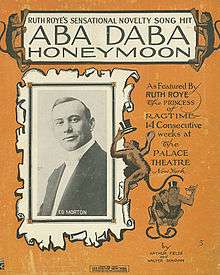Aba Daba Honeymoon
| "Aba Daba Honeymoon" | |
|---|---|
 "Aba Daba Honeymoon" music sheet cover (1914) | |
| Song | |
| Published | 1914 |
| Writer(s) |
Arthur Fields Walter Donovan |
| Language | English |
"Aba Daba Honeymoon" is a popular song written and published by Arthur Fields and Walter Donovan in 1914. Known through its chorus, "Aba daba daba daba daba daba dab, Said the chimpie to the monk; Baba daba daba daba daba daba dab, Said the monkey to the chimp,"[1] the first recording of "Aba Daba Honeymoon" was made in 1914 by the comic duo team of Collins & Harlan.
The song has had many cover versions over the years. In 1951 a version by Debbie Reynolds and Carleton Carpenter was a top five hit on the Billboard pop chart. Richard Hayes and Kitty Kallen also recorded the song and scored a top ten hit of their own.
Debbie Reynolds and Carleton Carpenter version
.png)
A cover of the song "Aba Daba Honeymoon" was featured in the 1950 film, Two Weeks with Love. The single released from that film was recorded by Debbie Reynolds and Carleton Carpenter on August 4, 1950, and issued as a single by MGM Records as catalog number 30282. It reached number 3 on the Billboard charts in 1951.
M-G-M sent the pair on a multicity personal appearance tour of Loews theaters to capitalize on its success, beginning in Washington, D.C.[2]
Other versions
- Richard Hayes and Kitty Kallen recorded the song for Mercury Records in 1951. It peaked at number 9 on the Billboard magazine chart.
- The Freddy Martin Ork with Merv Griffin also succeeded with the song on RCA Victor Records.
- Cass Daley and Hoagy Carmichael recorded a version for Decca Records.
- "Aba Daba Honeymoon" was featured on the 1959 soundtrack to Have Rocket, Will Travel, the first feature film to star the Three Stooges after their 1959 resurgence in popularity.[3]
- On a 1978 (3rd season) episode of Laverne & Shirley, the leads performed at a talent show singing "Aba Daba Honeymoon" in chimp suits on roller skates.
- Ronald McDonald and some kids covered this song in the 1995 McDonald's cassette tape "Silly Sing Along".
In popular culture
American novelist Thomas Pynchon referred to the song in a 1964 letter to a friend as "the nadir of all American expression": "Our souls [the world] leaves to whatever obsolescenses, bigotries, theories of education workable and un, parental wisdom or lack of it, happen to get in its more or less Brownian (your phrase) pilgrimage between the cord-cutting ceremony and the time they slide you down the chute into the oven, while the guy on the Wurlitzer plays 'Aba Daba Honeymoon' because you had once told somebody it was the nadir of all American expression; only they didn't know what nadir meant but it must be good because of the vehemence with which you expressed yourself."[4]
In the late 1970s and early 1980s, Fritos corn chips used the tune as the melody of their commercial jingle "Muncha buncha, muncha buncha, muncha buncha, muncha buncha, Fritos goes with lunch". The Houston, TX jewelry chain The Diamond Jewelry Factory used the melody in their TV advertisements.
References
- ↑ Herder, Ronald (October 1998). 500 Best-Loved Song Lyrics. Courier Dover Publications. p. 1. ISBN 0-486-29725-X.
- ↑ Reynolds, Debbie (2013). Unsinkable: A Memoir. HarperCollins Publishers. p. 201. ISBN 978-0-06-221365-5.
- ↑ Maurer, Joan Howard; Jeff Lenburg; Norman Maurer; Greg Lenburg (1985). The Three Stooges Scrapbook. Citadel Press. p. 187. ISBN 0-8065-0946-5.
- ↑ "The World is at Fault". Pynchon Wiki. Retrieved 3 March 2013.